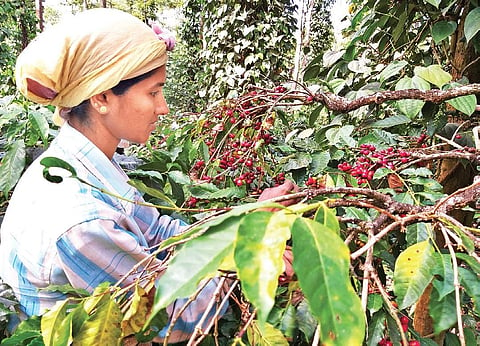

CHIKKAMAGALURU: While coffee lovers continue to enjoy every sip of their favourite beverage across the globe, farmers in Karnataka are a worried lot. Mostly engaged in coffee production in Chikkamagaluru, Kodagu and Hassan districts, they are battling steep rise in cost of production, decline in productivity, climate change and man-animal conflict.
“The general perception is that coffee growers are rich. But we are facing a wide range of problems, like any other farmer. While big coffee planters can resist the challenges, small growers, who comprise a large number, cannot,” said Ashok Kumar, who has two acres of coffee plantation at Menasina Malle Devarahalli near Chikkamagaluru.
Of the 79,161 coffee land holdings in Chikkamagaluru, Hassan, Madikeri and Virajpet, 76,960 holdings are of less than 10 acres, according to the Coffee Board of India data.“Karnataka produces 72 per cent of coffee in the country despite increase in cost of inputs like fertilizers, chemicals, labour wages and social expenditure. Cost of several inputs has shot up by 100 per cent over the last few years,” said a senior office-bearer of the Karnataka Planters’ Association.
“A bag of 50 kg of coffee beans was priced at Rs 7,000 around 20 years back. It is around Rs 7,100 to Rs 7,200 now. How is it possible to survive when on an average Rs 75,000 is invested per acre of plantation every year, but the price is so low? About seven to eight bags of beans can be grown in one acre,” said B S Jairam, president of Karnataka Growers’ Federation.
A KPA source said the productivity of Arabica variety is 478 kg per hectare in India, while it is 1,031 kg per hectare for Robusta. The productivity in Vietnam is 2,188 kg per hectare, and in Brazil, it is 1,256 kg. “We are battling low price due to excess production in Vietnam, Colombia and Brazil. Unfortunately, high yielding, and disease and drought resistant varieties in Arabica and Robusta are not released in India. Due to high incidence of white stem borer menace in Arabica, productivity has declined in both Arabica and Robusta. Central Coffee Research Institute has to undertake more research to develop high yielding and disease resistant varieties,” he said.
Coffee plantations are affected by several factors, including high temperatures, drought, cyclone depression and high rainfall, elephant menace and flash floods, according to the farmers.Traditional rainfall-prone plantation areas of Karnataka experienced dry spells from 2014-15 to 2017-18.
YEMEN COFFEE CONNECTION
Coffee is said to have been introduced by Baba Budan, a pilgrim travelling to holy Islamic places. Baba brought seven coffee seeds to India from Yemen in the 17th century, which were planted in the foothills of Chandragiri of Chikkmagaluru district. Typically mild and not too acidic, the local coffee possesses an exotic full-bodied taste and a fine aroma.